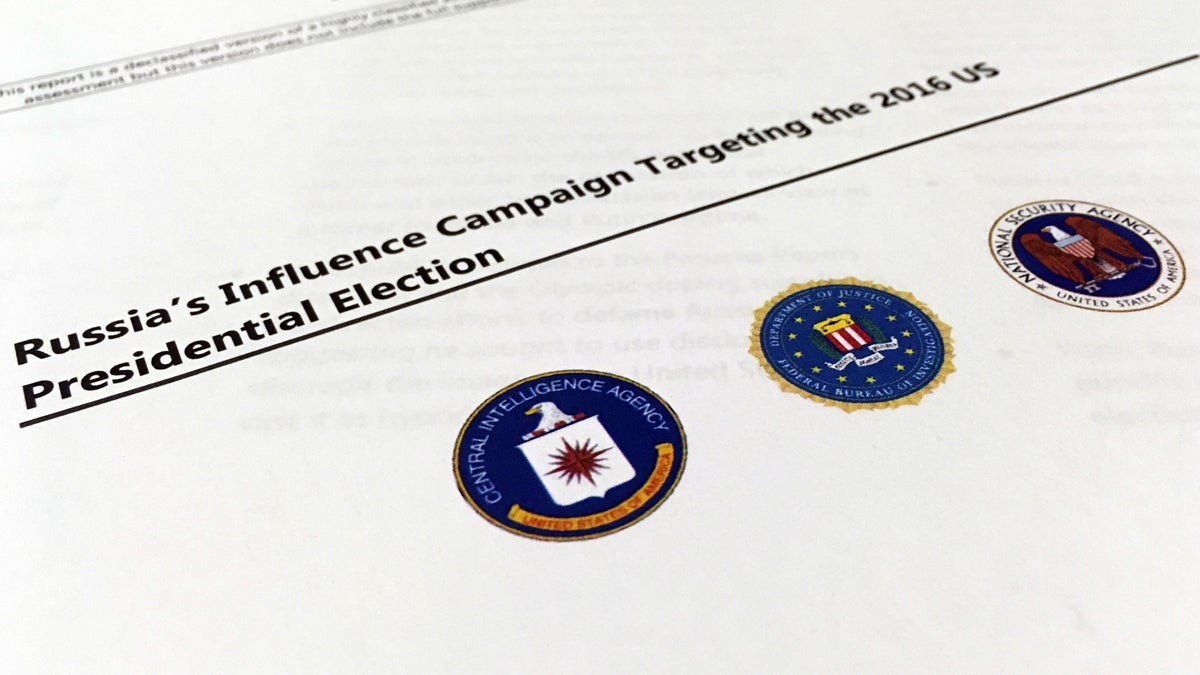Trump, the CIA, and the historical fallacy

A part of the declassified version of the Intelligence Community Assessment on Russia's efforts to interfere with the U.S. political process is photographed in Washington
Donald Trump is correct: The American intelligence community misled us about Saddam Hussein and weapons of mass destruction. So that means it’s also mistaken about Russian cyberattacks on the United States. Right?
Wrong. On New Year’s Eve, Trump called the Central Intelligence Agency’s claims about WMD a “disaster” — his signature slur — and implied that the agency was fibbing again. A few days later, he tweeted that his scheduled briefing on “intelligence” — a term Trump pointedly placed in quotation marks — and “the so-called ‘Russian hacking” had been pushed back to Jan. 5. “Perhaps more time needed to build a case,” Trump wrote. “Very strange!”
Following the briefing, Trump acknowledged that “Russia, China, other countries, other groups” had engaged in cyberwarfare against America. Yet he continued to insist that “there was absolutely no effect on the outcome of the election,” as if we could possibly know that. A declassified intelligence report released the same day confirmed that the Russians tried to influence the election, but emphasized that it could not render any judgment about whether–or how — the cyberhacking affected American public opinion or “political processes.”
Trump’s gibes at the CIA — and, especially, at its poor record in Iraq — reflect a common historical fallacy, which goes like this: Because something happened in the past, it’s also happening in the present. It’s a bipartisan reflex, infecting conservatives and liberals alike. And it’s poisonous to rational politics.
On the Right, the most frequent fallacy invokes the Munich Agreement and appeasement. Because British prime minister Neville Chamberlain allowed Hitler to march into Czechoslovakia, the U.S. and its allies shouldn’t let Saddam Hussein — or Bashar al-Assad, or Kim Jong-un — amass big stockpiles of lethal weapons or menace their neighbors.
And on the Left, it’s all about Vietnam. The United States intervened in a complicated civil war and ended up mired in a bloody quagmire. That means it should avoid entangling itself in other internecine conflicts, which will surely spell doom for our national interests.
But neither position makes any sense. Of course, the examples of Munich and Vietnam should help us frame questions about America’s role in the world. But history alone can never provide hard-and-fast answers, which will always depend on contemporary facts and contingencies.
On the domestic front, meanwhile, historical fallacies have often served to prop up the most enduring blot on American life: racial prejudice, especially on issues of criminal justice. Here’s a piece of history for you: African-Americans represented over half of America’s homicide offenders between 1980 and 2008, when blacks’ overall share of the national population rose from about 10 to 12 percent.
But it hardly follows that any black guy you encounter on the street is a violent criminal. Nor does it mean that police officers should regard African-Americans with greater suspicion. Both of these habits are racist, to their core, because they rely on historical patterns to judge a particular human being.
By the same token, however, it’s unfair to assume that any police officer you meet is somehow a danger to black people. That’s prejudice, too, invoking history — in this case, the historical fact of racial profiling and harassment — to assess an individual.
Indeed, charges of racism can reflect historical fallacies every bit as much as racism itself does. Consider last fall’s controversy over Tiffany Martinez, the Latina student at Suffolk University whose professor charged her with plagiarism. In a blog post that went viral, Martinez said that the professor had singled her out because of her race.
Perhaps so. But when I told a recent public forum at my university that we couldn’t be sure of the professor’s intent, without more information, the room caught fire. Everyone who spoke insisted that the student was a victim of racism. And if I questioned that, I simply didn’t understand the history of bigotry and violence against people of color.
Actually, I’ve spent a good part of my career studying that history. Racism is encoded in our national DNA, dating to the birth of America and continuing into the present. But the historical fact of racism does not prove every accusation of it, any more than the high proportion of crimes committed by one race makes every member of it a criminal.
And that brings us back to our hard-to-categorize president-elect, who has indulged in fallacies from every side of the political spectrum. Start with Trump’s calls to ban Muslims, which reflect the most vicious kind of racism in the American playbook: because Muslim terrorists murdered innocents in San Bernardino and Orlando, every Muslim should be suspected as a terrorist and barred from our nation.
But Trump’s recent barbs at the CIA echo left-wing fallacy-mongers, who point to prior agency lies as alleged proof of its present-day perfidy. Did the CIA distort intelligence about Hussein’s weapon stockpile in Iraq? Sure. But that doesn’t speak to the validity of its claims about recent Russian efforts to undermine our elections via cyberattacks, which were confirmed by the Federal Bureau of Investigation and the National Security Agency as well as by the CIA in the declassified report released on Friday.
Indeed, the Iraq debacle was itself based on a historical fallacy. As President George W. Bush correctly reminded the world, Saddam Hussein had used chemical weapons to murder his own people. But it was incorrect to assume that he still possessed such weapons, simply because he had employed them in the past.
So yes, given the CIA’s prior record, we should scrutinize everything it tells us. And we should do the same for everything that comes out of the exceptionally loud mouth of Donald J. Trump, who also told his New Year’s Eve audience that he knew “things that other people don’t know” about Russian cyberhacking.
Maybe he did. We shouldn’t assume he was lying, just because he had done so many times before. We all know where that fallacy goes.
—
Jonathan Zimmerman teaches education and history at the University of Pennsylvania. He is the author of “Campus Politics: What Everyone Needs to Know” (Oxford University Press)
WHYY is your source for fact-based, in-depth journalism and information. As a nonprofit organization, we rely on financial support from readers like you. Please give today.




